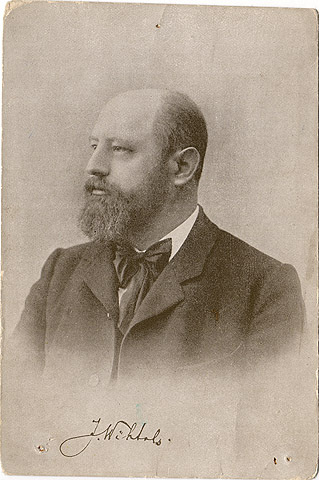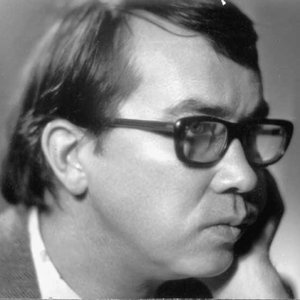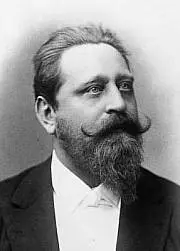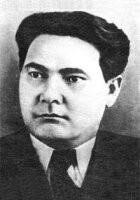
Язепс Витолс (Язепс Витолс) |
Jázeps Vitols
All my success is in the joy that the work was a success. J. Vytols
J. Vitols is one of the founders of the Latvian musical culture – a composer, teacher, conductor, critic and public figure. Deep reliance on the national Latvian origins, the traditions of Russian and German music determine its artistic appearance.
The German influence was especially pronounced in the early years. The whole environment of the provincial Valmiera, where the composer was born into the family of a Jelgava gymnasium teacher, was imbued with the spirit of German culture – its language, religion, musical tastes. It is no coincidence that Vitols, like many other representatives of the first generation of Latvian musicians, learned to play the organ as a child (in parallel, he studied violin and piano). At the age of 15, the boy began to compose. And when in 1880 he was not admitted to the St. Petersburg Conservatory in the viola class (due to poor hand placement), he happily turned to composition. The compositions shown to N. Rimsky-Korsakov decided the fate of the young musician. The years spent at the conservatory (Vitols graduated in 1886 with a small gold medal) in contact with outstanding masters, with the high artistic culture of St. Petersburg, became an invaluable school for the young Vitols. He becomes close to A. Lyadov and A. Glazunov, actively participates in the meetings of the Belyaevsky circle headed by Rimsky-Korsakov, and after the death of M. Belyaev receives friends in his hospitable house.
It was in this atmosphere, still filled with the spirit of “Kuchkism” with its interest in the national-peculiar, folk, democratic, that the young musician, who in St. Petersburg was respectfully called Iosif Ivanovich Vitol, felt his vocation as a Latvian artist. And subsequently, he repeatedly claimed that in Russia his compatriot composers “found … the most cordial support for everything that was in our Latvian music: the Russian loves not only … deeply original in his music, but he also treats national elements in the work of other peoples.
Soon Vitols becomes close to the St. Petersburg colony of his compatriots, he directs the Latvian choirs, promotes the national repertoire.
In 1888, the composer took part in the third General Song Festival in Riga, constantly showing his works at the annual “Autumn Concerts” of Latvian music. The genres in which Vitols worked were close to the settings of the Korsakov school: adaptations of folk songs, romances (c. 100), choirs, piano pieces (miniatures, Sonata, variations), chamber ensembles, program symphonic works (overtures, suites, poems, etc.). . p.), and in the field of symphony and piano music, Vitols became a pioneer in Latvia (the birth of the first Latvian score is associated with his symphonic poem “League Holiday” – 1889). Starting his career as a composer with piano pieces and romances, from the late 80s. Vitols gradually finds those genres that most closely meet the national needs of his artistic nature – choral music and program symphonic miniatures, in which he colorfully and poetically embodies the images of his native folklore.
All his life Vitols’s attention was focused on the folk song (more than 300 arrangements), the features of which he widely implemented in his work. 1890s and 1900s – the time of creation of the best works of the composer – choral ballads on a national patriotic theme – “Beverinsky Singer” (1900), “Lock of Light”, “The Queen, the Fiery Club”; symphonic suite Seven Latvian Folk Songs; overture “Dramatic” and “Spriditis”; piano Variations on a Latvian folk theme, etc. During this period, Vitols’ individual style finally takes shape, gravitating towards clarity and objectivity, epic picturesqueness of the narration, picturesque subtle lyricism of the musical language.
In 1918, with the formation of the Republic of Latvia, Vitols returned to his homeland, where he devoted himself to educational and creative activities with renewed vigor, continued to compose, and took part in the organization of Song Festivals. At first, he directed the Riga Opera House, and in 1919 he founded the Latvian Conservatory, in which, with a short break until 1944, he held the position of rector. Now the conservatory bears his name.
Vitols began to study pedagogy in St. Petersburg, having spent more than 30 years in Russia (1886-1918). Not only outstanding figures of Russian music (N. Myaskovsky, S. Prokofiev, V. Shcherbachev, V. Belyaev, etc.) passed through his theoretical and composing classes, but also many people from the Baltic States who laid the foundation of their national composing schools (Estonian K Turnpu, Lithuanians S. Shimkus, J. Tallat-Kyalpsha and others). In Riga, Vitols continued to develop the pedagogical principles of Rimsky-Korsakov – high professionalism, love for folk art. Among his pupils, those who later will be the pride of Latvian music are composers M. Zarins, A. Žilinskis, A. Skultė, J. Ivanov, conductor L. Vigners, musicologist J. Vītoliņš and others. Petersburg German newspaper St. Petersburger Zeitung (1897-1914).
The composer’s life ended in exile, in Lübeck, where he left in 1944, but his thoughts to the end remained in his homeland, which forever preserved the memory of its outstanding artist.
G. Zhdanova





